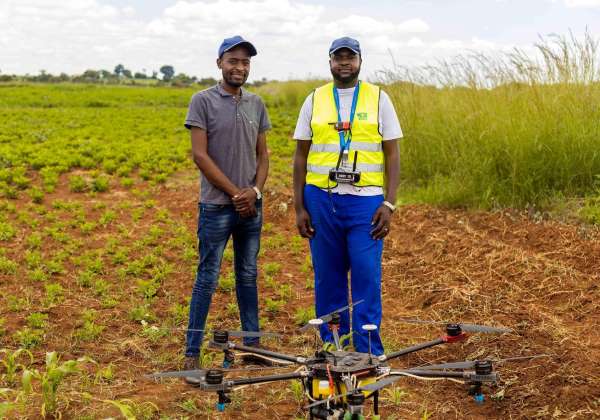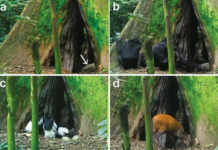Two university graduates in Zimbabwe Anesu Mapisa and Emmanuel Marume have partnered to form a company, FarmBuzz that assists farmers improve their yield using drone equipment.
The two graduated in 2018 at the Midlands State University in Zimbabwe with Bachelor of Science in Agronomy degrees.
Mapisa started a discussion with Marume on the idea of partnering as entrepreneurs and the latter agreed.
“Even though we did not have the capital to plunge into business, this was a dream come true; first, we needed to figure out how to help the farmers increase their yields,” Mapisa said.
“I was raised on a farm in Macheke. So, my parents were farming at a low level, and it was not producing much,” he said.
“I wanted to bring solutions to subsistence farmers, including my parents, so they can improve their yield, which can sustain the family and the farm.”
With a growing trend in Zimbabwe where the young in urban areas are migrating to rural areas to farm, Mapisa and Marume recognised many of the new young farmers were encountering losses and needed knowledge and hands-on people on their farms.
The new “cellphone farmers” were spending a lot of time and money on manually spraying pesticides and herbicides, without getting better results than they were paying for.
Mapisa and Marume turned to social media platforms to teach farmers about the efficiency in farming and to seek customers.
“We worked on the company from scratch, without capital, without anything; we just started doing consultancy on Instagram and Facebook and grew from there,” Mapisa (22) said.
Most of their work is on farm management, season budgeting, and consultancy services.
“We promote smart farming in Zimbabwe through best agronomy practices and agrotechnology. We realised there was a need for a solution that would bring efficiency and precision in how our farmers weed. So we introduced drones as part of our services.”
They later sought collaborations to raise capital and their first engagement was with Alley Capital Group, a local company that had just entered the Zimbabwean market with drone technology.
After negotiations, a partnership inked in 2019, and Farm Buzz introduced drones to the agriculture market.
“Many farmers are losing money, using other traditional methods like knapsack sprayers and boom sprayers, which are costly and inefficient,” Marume added.
“They are losing a lot of chemicals through these methods. Knapsacks are heavy, and you need more workforce. For example, one person can spray one hectare a day, using a knapsack, but with a drone, one hectare can be done in 15 to 30 minutes,” he said.
“When using drones, there is no fuel used compared to boom sprayers. With tractors, which pull the boom spray, there should be diesel. I believe this has a positive bearing on the environment; we need to reduce emissions in agriculture,” Mapisa explained.
The company also uses drones for farm mapping and scouting, helping farmers know the exact size of their fields for proper planning and resource use.
“My father, for instance, who has been farming for 20 years, uses the old methods such as knapsacks and boom sprayers because these have served him well over the years,” Mapisa said.
One of the beneficiaries of the project Louise Musungwa, farms in Nyabira, some 25 kilometers from Harare.
Musungwa ventured into farming after retiring from nursing five years ago.
“I was born on a farm; my father had a farm in Masvingo, but I never liked farming. After school, I went and did nursing, and I worked as a nurse, mostly abroad, until I retired and returned home,” she said.
“I decided to revisit my youth where I was forced to do farming. So, I started farming. I have been farming for five years, and because I didn’t have the land, I just rent from those who have unutilised land.”
After embracing drone technology to farm, she is seeing better returns from her 10 hectares. Previously, it would take her workers weeks to clear weed, forcing her to commute from the city daily.
“I was using people, and they were cheating me: most of them were just not serious, they were interested in money, not the yield and health of crops,” Musungwa recalled.
Musungwa also used a tractor to spray but was not happy with the outcome. “I like to be on the ground, ensuring that things are being done by the book, instructing where I can,” she explained.
“With drones, I can sacrifice a day and know that I am done with an activity,” Musungwa said.









